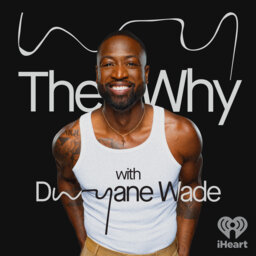Dwyane sits down with bestselling author, podcast host and life coach, Jay Shetty to discuss his time living as a monk, transitioning his learnings to the "real world" and what he does when he is with his friends. The two talk about how to practice stillness in life, spiritual awakening as well as understanding yourself and others. They also get into their passions for movies, video games, pickleball and tattoos.
In 1 playlist(s)
The Why with Dwyane Wade
Dwyane Wade sits down with pioneers in sports, fashion, music, and business for an intimate conversa…Social links
Follow podcast
Recent clips

The Wine Down: Dwyane Wade Sr. vs. Jr.
1:37:33

Coming out of Retirement with Bob Iger
1:11:29

The Wine Down: Team USA, Hall-of-Fame Class, WNBA Draft, Biggie and Tupac
1:35:15
 The Why with Dwyane Wade
The Why with Dwyane Wade